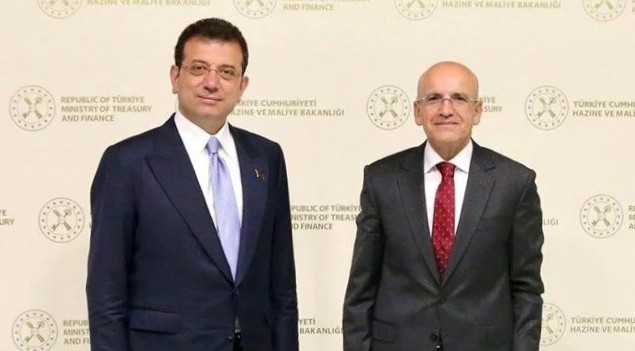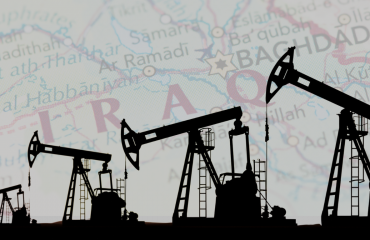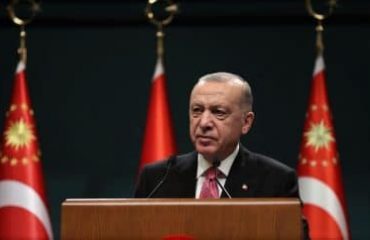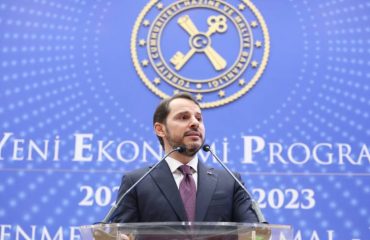

Affected by the political crisis due to mayor of Istanbul, Imamoglu (L), foreign investors ask Turkish Finance Minister Şimşek “What is next?” (Archive photo)
The İmamoğlu Crisis continues. Not only on the Turkish domestic political front, but also in terms of its effects on the economy. Foreign investors, preoccupied with the Russia-Ukraine crisis, noticed the Türkiye bleep on their radar screens by the detention of İstanbul Metropolitan Mayor Ekrem İmamoğlu on March 19. Following his arrest by the court, imprisonment on March 23 and removal from mayorship, foreign investors started asking Turkish Treasury and Finance Minister Mehmet Şimşek, “What’s next?”
On March 25, he and Central Bank Governor Fatih Karahan held a meeting with major foreign investors. The meeting, which was announced to be “hosted” by Citibank and Deutsche Bank, was so last minute that some investors said they could not make it and would attend via video conference. Those who flew to Ankara sought separate meetings with Şimşek and Deputy President Cevdet Yılmaz.
Referring to what was sold from the Turkish (Central Bank and public banks) reserves, estimated to be between 20-25 billion USD to suppress the skyrocketing exchange rate, the main opposition CHP leader Özgür Özel argues that Erdoğan, out of the 42 billion dollars that Şimşek had saved with difficulty, had melted 60 percent of it in three days out of fear of İmamoğlu.
According to media reports, Şimşek’s answer to the questions of investors about the arrest of İmamoğlu was consisting of two words: “No comment”.
What is Şimşek really being asked?
It was not a surprise for foreign investors when Şimşek said the AKP cabinet led by President Tayyip Erdoğan would “Continue with the program, everything is fine.” This is his job. But when foreign investors are asking Şimşek “What’s next?” they are actually asking whether there are any other nasty political surprises that could shake the investment climate.
What foreign investors want to ask Şimşek “What’s next?” can be divided into two categories: questions about short-term risks and questions about long-term risks.
The short-term questions are really short-term, like the next ten days or so. It is possible to deduce from the frequently asked questions why it is ten days. For example,
– Will the government appoint a trustee to İstanbul Municipality?
– Will Mansur Yavaş, the mayor of Ankara, be investigated and arrested? Will a trustee be appointed in his place?
– Is there a possibility that a trustee will be appointed in charge of the main opposition CHP?
– Will the CHP’s extraordinary congress be canceled? (This demand was rejected by an Ankara court on March 26, which means a bit of relief regarding the crisis.)
CHP leader Özgür Özel announced that the extraordinary congress will be held on April 6. Ten days are coming from there; the court decision has to be issued before April 6.
In the long run, the questions are getting into dangerous waters. If these short-term “risks” come true and the situation becomes more chaotic, what are the chances that the government will resort to harsher measures? No one wants to mention the possibility of State of Emergency, even though it is starting to be whispered in the political backstage.
If you could only ask one question?
Even if these and similar questions were asked to Şimşek, even a sugar-coated one, is there any chance that Şimşek would give an answer other than “It’s nothing for us, it’s the decision of the independent courts, the program is standing firm”?
If you were given the right to ask Şimşek one question these days, what would you ask?
I don’t count populist and easy questions like “Will you resign?”.
The promise of “more taxes on the rich and less on the poor”, which we have heard from who knows how many governments, is also caught in the populist and clientelist pressure by interest groups within the AK Party while polls show the CHP in first place.
If I had only one question for Şimşek these days, I think I would ask him the following: “How will you maintain the anti-inflation program when the economy is shaken a little more every time the courts rule against opposition politicians?”
Right now, both politics and the economy have a problem with the judiciary.
I also wonder: Does Minister Şimşek ask similar questions to President Erdoğan?
Do you think he does?


